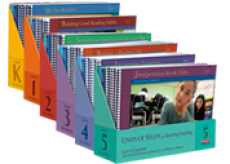Units of Study for Teaching Reading Video Orientations, Grades K–5
My co-authors and I are pleased as punch with the new Units of Study in Teaching Reading. To give you the best possible send off to a year with these units. We developed a collection of free Getting-Started Videos which are grade-specific mini-courses (k-5) that will give you a great start to teaching the new Units of Study for Teaching Reading, K -5. We thought about the most important advice we can give as you at this critical moment. You’ll be given a fast-paced overview of the sequence of units for your grade level, answers to predictable questions, and nuts and bolts help with the first unit. With Heinemann’s help, each mini-course is studded with video clips and images of classrooms.
lf you’ll be teaching the new Units of Study for Teaching Reading. K -5, you’ll want to gather with colleagues at your grade Level and use this offering to support an hour-long study group. Of course. you can also zoom in on just one subtopic or another. We also created a separate mini-course that overviews the performance assessments and learning progressions.
Lucy



